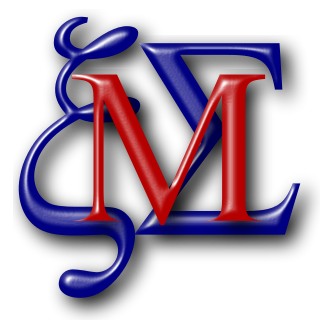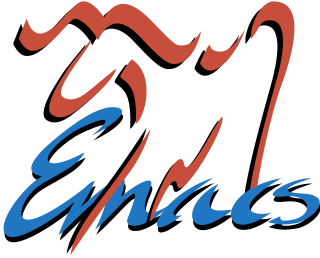
Emacs Lisp is a dialect of the Lisp programming language used as a scripting language by Emacs. It is used for implementing most of the editing functionality built into Emacs, the remainder being written in C, as is the Lisp interpreter. Emacs Lisp is also termed Elisp, although there is also an older, unrelated Lisp dialect with that name.

An integrated development environment (IDE) is a software application that provides comprehensive facilities to computer programmers for software development. An IDE normally consists of at least a source code editor, build automation tools and a debugger. Some IDEs, such as NetBeans and Eclipse, contain the necessary compiler, interpreter, or both; others, such as SharpDevelop and Lazarus, do not.

w3m is a free software/open source text-based web browser and terminal pager. It has support for tables, frames, SSL connections, color, and inline images on suitable terminals. Generally, it renders pages in a form as true to their original layout as possible.

XEmacs is a graphical- and console-based text editor which runs on almost any Unix-like operating system as well as Microsoft Windows. XEmacs is a fork, based on a version of GNU Emacs from the late 1980s. Any user can download, use, and modify XEmacs as free software available under the GNU General Public License version 2 or any later version.
James Werner Zawinski, commonly known as jwz, is an American computer programmer with contributions to the free software projects Mozilla and XEmacs, and early versions of the Netscape Navigator web browser. He maintains the XScreenSaver project which provides screenblanking for Mac OS X and for Unix and Unix-like computers using the X Window System.

Maxima is a computer algebra system (CAS) based on a 1982 version of Macsyma. It is written in Common Lisp and runs on all POSIX platforms such as macOS, Unix, BSD, and Linux, as well as under Microsoft Windows and Android. It is free software released under the terms of the GNU General Public License (GPL).

Gnus, or Gnus Network User Services, is a message reader which is part of GNU Emacs. It supports reading and composing both e-mail and news and can also act as an RSS reader, web processor, and directory browser for both local and remote filesystems.
In software engineering, a project fork happens when developers take a copy of source code from one software package and start independent development on it, creating a distinct and separate piece of software. The term often implies not merely a development branch, but also a split in the developer community, a form of schism.

Macintosh Programmer's Workshop or MPW, is a software development environment for the Classic Mac OS operating system, written by Apple Computer. For Macintosh developers, it was one of the primary tools for building applications for System 7.x and Mac OS 8.x and 9.x. Initially MPW was available for purchase as part of Apple's professional developers program, but Apple made it a free download after it was superseded by CodeWarrior. On Mac OS X it was replaced by the Project Builder IDE, which eventually became Xcode.
Ctags is a programming tool that generates an index file of names found in source and header files of various programming languages to aid code comprehension. Depending on the language, functions, variables, class members, macros and so on may be indexed. These tags allow definitions to be quickly and easily located by a text editor, a code search engine, or other utility. Alternatively, there is also an output mode that generates a cross reference file, listing information about various names found in a set of language files in human-readable form.
Dunnet is a surreal, cyberpunk text adventure written by Ron Schnell, based on a game he wrote in 1982. The name is derived from the first three letters of dungeon and the last three letters of Arpanet. It was first written in Maclisp for the DECSYSTEM-20, then ported to Emacs Lisp in 1992. Since 1994 the game has shipped with GNU Emacs; it also has been included with XEmacs.
Lucid Incorporated was a Menlo Park, California-based computer software development company. Founded by Richard P. Gabriel in 1984, it went bankrupt in 1994.
The MULtilingual Enhancement (MULE) is computer software which adds extra written language characters to the GNU Emacs text editor and programming environment.
Hemlock is a free Emacs text editor for most POSIX-compliant Unix systems. It follows the tradition of the Lisp Machine editor ZWEI and the ITS/TOPS-20 implementation of Emacs, but differs from XEmacs or GNU Emacs, the most popular Emacs variants, in that it is written in Common Lisp rather than Emacs Lisp and C—although it borrows features from the later editors. Hemlock was originally written by the CMU Spice project in Spice Lisp for the PERQ computer.

GNU Bazaar is a distributed and client–server revision control system sponsored by Canonical.

Aquamacs is an Emacs text editor for macOS. It is based on GNU Emacs, currently tracking the GNU Emacs version 25.3 branch. Although GNU Emacs has had native UI support on macOS using the Cocoa API since version 23, Aquamacs modifies the user interface to conform with macOS standards in favor of Emacs standards.

GNU Emacs is a free software text editor. It was created by GNU Project founder Richard Stallman. In common with other varieties of Emacs, GNU Emacs is extensible using a Turing complete programming language. GNU Emacs has been called "the most powerful text editor available today". With proper support from the underlying system, GNU Emacs is able to display files in multiple character sets, and has been able to simultaneously display most human languages since at least 1999. Throughout its history, GNU Emacs has been a central component of the GNU project, and a flagship of the free software movement. GNU Emacs is sometimes abbreviated as GNUMACS, especially to differentiate it from other EMACS variants. The tag line for GNU Emacs is "the extensible self-documenting text editor".

Emacs or EMACS is a family of text editors that are characterized by their extensibility. The manual for the most widely used variant, GNU Emacs, describes it as "the extensible, customizable, self-documenting, real-time display editor". Development of the first Emacs began in the mid-1970s, and work on its direct descendant, GNU Emacs, continues actively as of 2020.











